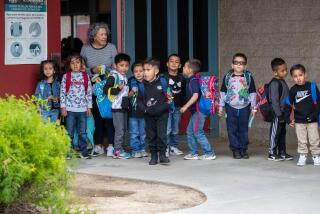Plan Ahead to Help Ensure You Have a Happy Camper
- Share via
Very soon, the exodus begins. About 5 million U.S. children will pack their little suitcases and head for summer camp.
Off they go to more than 8,500 day and residential camps to make new friends, eat gooey marshmallows and gather anecdotes for next fall’s school essays.
What can parents do before their offspring leave to be sure they are healthy as well as happy campers?
First, check out the camp, says the American Academy of Pediatrics. Ideally, every camp should have a staff nurse and a physician who is not only on call, but also a regular visitor. All camp counselors should be trained in first aid.
“Be sure your children’s immunizations are up-to-date before they leave”--and that includes tetanus shots, said Dr. Loraine Stern, a Los Angeles-area pediatrician.
“Pack sunscreen and tell them how to use it. Put some insect repellent in their suitcases, too. Stick to lotion or stick form. I don’t trust kids with sprays,” said Stern.
Parents should also be certain their children are psychologically ready for camp. Most boys and girls are ready to go to day camp at age 6 or 7 and residential camp at age 9 or 10, although experts say readiness varies from child to child.
Children who enjoy class trips, invite friends to sleep over at their homes and who respond positively to adult supervision seem to do best at summer camps.
Parents can build emotional readiness if it seems to be lacking. “Be supportive and tell the child you are proud he or she is becoming independent,” said Karol Fishler, a clinical psychologist at Childrens Hospital Los Angeles. “Once the child is at camp, send a post card or two. Think about sending one ahead of time, so it will be there when the camper arrives.”
“If children are age 8 or younger, pack a familiar object like a teddy bear,” suggested Stern. “If they are embarrassed, they can always keep it hidden in the suitcase.” Family pictures, tucked into a suitcase, might also quell feelings of homesickness, she said. Kids who are adamantly opposed to going to camp probably are not ready for the experience, experts agree.
Summer camps should be viewed as more than a vacation. The best camp programs help children gain a broader perspective of life, become less self-centered and develop special skills such as art and mathematics, say psychologists.
More to Read
Sign up for Essential California
The most important California stories and recommendations in your inbox every morning.
You may occasionally receive promotional content from the Los Angeles Times.













